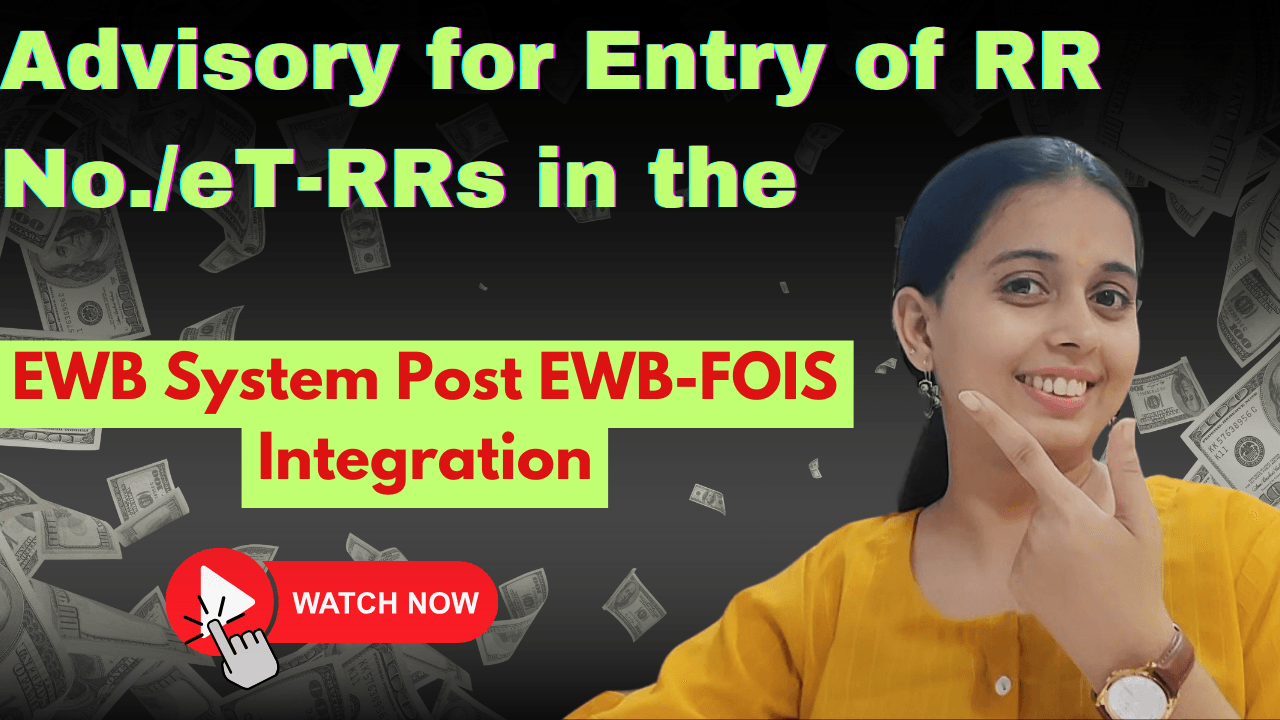EWB System Post EWB-FOIS Integration
EWB System Post EWB-FOIS Integration The integration of the E-Way Bill (EWB) system with the Freight Operations Information System (FOIS) of Indian Railways marks a significant milestone in streamlining goods transportation in India. This blog aims to provide a detailed understanding of the integration and guide taxpayers on the accurate entry of Railway Receipt Numbers (RR No.) or eT-RRs in the EWB system.
Understanding the EWB-FOIS Integration
The EWB-FOIS integration uses Application Programming Interfaces (APIs) to link the E-Way Bill system with the FOIS of Indian Railways. This integration aims to simplify the movement of goods via rail by:
- Enhancing transparency in goods transportation.
- Reducing manual errors in data entry.
- Ensuring seamless validation of goods movement.
Taxpayers transporting goods through Indian Railways are now required to adhere to specific guidelines for entering RR No./eT-RRs in the EWB system. Let’s delve into these requirements.
Applicability of RR No./eT-RRs in the EWB System
Taxpayers who transport goods via the FOIS must ensure proper entry of RR No./eT-RRs in the EWB system. This is critical for:
- Ensuring compliance with the integration guidelines.
- Avoiding discrepancies during validation processes.
- Facilitating the accurate tracking of goods.
The format for entering RR No./eT-RRs has been standardized to maintain consistency across all stakeholders.
Updating Part-B of EWB for Rail Transportation
Scenario: When goods are moved from the factory to the railway station under an existing EWB and then transported by rail through FOIS, taxpayers must update Part-B of the EWB using the following steps:
- Access the EWB Portal: Log in to the EWB portal and navigate to the update section of the existing EWB.
- Choose the Multi-Transport Mode Option: Select the “Multi-Transport Mode” option to update Part-B.
- Select Rail as the Mode of Transport: Indicate that the subsequent mode of transport is “Rail.” EWB System Post EWB-FOIS Integration
- Enter RR No./eT-RRs: Input the Railway Receipt Number (RR No.) or eT-RRs as prompted. This number is critical for tracking and validation.
Format for Entering RR No./eT-RRs
To ensure consistency and accuracy, taxpayers must use the following format when entering RR No./eT-RRs:
Format: F<FromStationCode><RR No>
Example: If goods are dispatched from station SJWT and the RR No. is 123456789, the entry in the EWB system should be:
FSJWT123456789
This standardized format helps maintain uniformity and simplifies the validation process.
EWB and RR No./eT-RRs Validation Process
The EWB system validates the entered RR No./eT-RRs against the data received from the FOIS. Here’s how the validation works:
- Real-time Validation: The EWB system cross-checks the RR No./eT-RRs with FOIS records.
- Mismatch Alerts: If the entered RR No./eT-RRs does not match FOIS data, an alert is generated.
- Discrepancy Resolution: Taxpayers are advised to ensure the accuracy of entries to avoid delays or rejections. EWB System Post EWB-FOIS Integration
Importance of Accurate Entry
Accurate entry of RR No./eT-RRs in the EWB system is crucial for:
- Ensuring Smooth Goods Movement: Proper documentation minimizes disruptions during transit.
- Avoiding Penalties: Errors in RR No./eT-RRs entries can lead to validation failures and penalties. EWB System Post EWB-FOIS Integration
- Facilitating Seamless Compliance: Accurate data entry aligns with Indian Railways and GSTN guidelines.
Steps for Assistance and Discrepancy Resolution
In case of issues or discrepancies in entering RR No./eT-RRs, taxpayers can:
- Raise a Support Ticket: Log in to the EWB portal and submit a ticket detailing the issue.
- Provide RR No./eT-RRs Details: Clearly mention the RR No./eT-RRs in question to expedite resolution.
- Follow e-Demand Guidelines: Adhere to Indian Railways’ specific instructions for e-Demand customers. EWB System Post EWB-FOIS Integration
Benefits of EWB-FOIS Integration
The integration offers several advantages, including:
- Enhanced Transparency: Real-time data exchange between the EWB system and FOIS improves visibility.
- Streamlined Operations: Automated validation reduces manual intervention and errors.
- Better Compliance: Taxpayers can ensure adherence to transport and tax regulations.
https://docs.ewaybillgst.gov.in/Documents/Advisory_on_EWB_for_Railway_Customer.pdf
Conclusion
The EWB-FOIS integration is a transformative step in modernizing goods transportation in India. By ensuring accurate entry of RR No./eT-RRs, taxpayers can enjoy smoother operations, faster validations, and better compliance. EWB System Post EWB-FOIS Integration Adhering to these guidelines will not only simplify logistics but also enhance efficiency in the broader supply chain ecosystem. EWB System Post EWB-FOIS Integration
For further assistance, taxpayers are encouraged to reach out to the GSTN support team. Let’s work together to ensure a seamless transition and compliance with these new processes.
For More Information : https://taxgyany.com/

